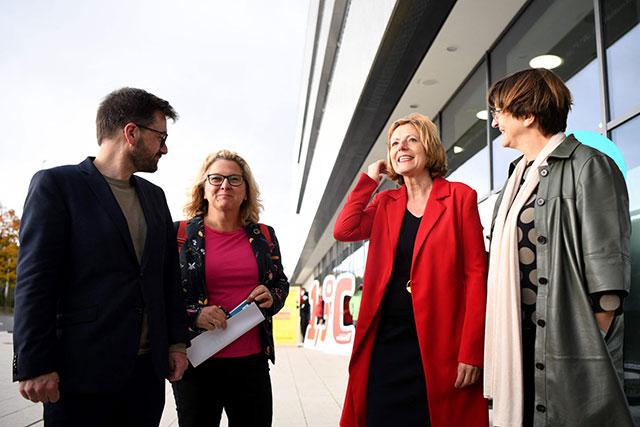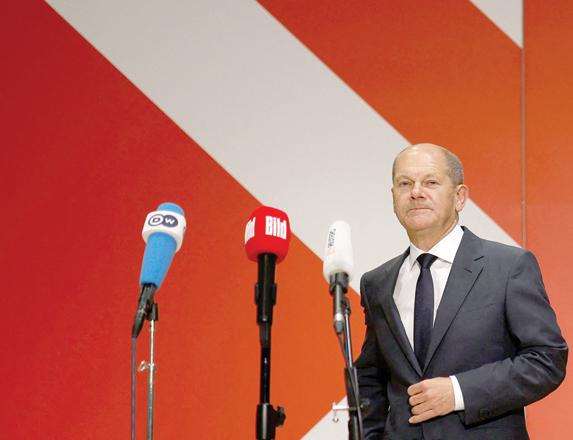You are here
German parties eye Scholz-led govt by early December
By AFP - Oct 22,2021 - Last updated at Oct 22,2021

Germany's Social Democratic SPD party co-leader Saskia Esken (first right), Rhineland-Palatinate's State Premier and member of Germany's Social Democratic SPD Party Malu Dreyer (second right), Chairman of the SPD parliamentary group in Nordrhein-Westfalen Thomas Kutschaty (first left) and German Environment Minister and member of Germany's Social Democratic SPD Party Svenja Schulze are seen prior to a press conference before the start of coalition talks between Germany's Green Party - Die Gruenen, the Free Democratic Party and the Social Democratic Party SPD, during a wind storm in Berlin on Thursday (AFP photo)
FRANKFURT — The three parties working to form Germany's next government on Thursday unveiled an accelerated timeline for their coalition talks, saying they aimed to have Social Democrat Olaf Scholz installed as chancellor by early December.
"The timeline is ambitious," said Volker Wissing, general secretary of the liberal Free Democrats (FDP), at the start of formal coalition talks with the centre-left Social Democratic Party (SPD) and the Greens. "Germany needs to have a stable government as soon as possible," he told a Berlin press conference.
The three parties, which have never before teamed up together on a federal level in Germany, said they wanted the coalition negotiations to be wrapped up by the end of November.
This would allow for a government to be in place early December, with Scholz -- the current finance minister and vice chancellor -- to be elected chancellor by the Bundestag lower house of parliament "in the week of December 6", Wissing said.
The three parties had earlier targeted a Christmas deadline, signalling they are optimistic about clinching a deal despite not being natural bedfellows. If they succeed in sticking to the faster schedule, Chancellor Angela Merkel will fall short of breaking Helmut Kohl's record as the longest-serving leader in post-war Germany -- by just a few days. Merkel herself is bowing out of politics after 16 years in power but will stay on in a caretaker capacity until a new government is in place. European Union peers are watching the German events closely, aware that the next leader of the bloc's most populous country and its largest economy will play a key role in helping to shape future EU policies too. 'New start'
Scholz's Social Democrats narrowly won a September 26 general election, while the Greens and the FDP came third and fourth respectively, thrusting the two smaller parties into the role of kingmakers. Merkel's centre-right CDU-CSU alliance scored its worst-ever election result and came second, leaving the conservatives preparing for a stint in the opposition.
However, CDU leader and chancellor hopeful Armin Laschet has said he remains open to trying to form a government with the kingmaker parties should the Scholz-led effort fail.
But the SPD, FDP and Greens have voiced confidence they can build what Scholz has called a "coalition of progress", also dubbed a "traffic light" alliance after the parties' red, yellow and green colours.
Green Party general secretary Michael Kellner said Germany had a chance "at a new start".
Negotiators from the three parties will now split up across 22 working groups. They have until November 10 to come up with what will form the basis for a coalition agreement.
A smaller team of negotiators will then take over to resolve the "last remaining areas of conflict" by the end of that month, said SPD general secretary Lars Klingbeil.
The teams will be working from an in-principle agreement struck last week, which sketched out the major policy priorities for the next four years. It includes massive investments in climate protection, infrastructure and education to help Germany, an ageing nation and export powerhouse, prepare for a greener and more digital future.
Finance minister speculation
With pledges to respect Germany's debt limits and not raise taxes -- both flagship FDP campaign promises -- it remains to be seen however how the plans will be financed.
The three parties also want to lower the voting age from 18 to 16, raise the minimum wage to 12 euros per hour and bring forward Germany's coal exit.
Speculation is growing about who will snag the coveted finance ministry portfolio, with observers betting on FDP leader Christian Lindner or Greens co-leader Robert Habeck.
Depending on who gets the job, Germany could walk a very different fiscal path.
The FDP traditionally favours low public spending, low taxes and wants private companies to take the lead in fighting climate change. It also wants to maintain Germany's cherished "debt brake" that limits new borrowing. The Greens meanwhile want to spend 500 billion euros on climate protection measures over the next decade, hoping to find "leeway" within the debt brake.
Related Articles
FRANKFURT — Germany inched towards a government led by Olaf Scholz after the Greens and the liberal FDP party said Wednesday they would try
BERLIN — Olaf Scholz's hopes of forming Germany's next coalition government were given a boost Wednesday with congratulations from outgoing
Berlin — Germany's centre-left Chancellor Olaf Scholz lost a confidence vote on Monday after weeks of turmoil, setting Europe's b

















